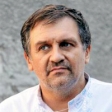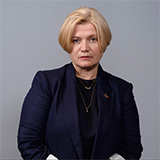"Обрежем", "подвесим", "лишим девушку иллюзий"
"Мы их похороним" + стуканье ботинком по трибуне ООН – из репертуара Никиты Сергеевича. Но тогда был пик "холодной войны". А сейчас? Судя по процитированной выше лексике ВВП (и это же далеко не все его перлы), Россия таки сползла не только в авторитаризм, но и в атмосферу "холодной войны", поисков внутреннего и внешнего врага. А высказывания Путина в отношении Украины, да еще и намеренно ретранслируемые ТВ, выходят за рамки не только принятого в дипломатии, но и вообще лексики воспитанного человека, каковым он себя, видимо, все-таки считает. И дело не в "злобных" украинских националистах. Путину нужно показать российской публике, что демократия не работает в Украине и, соответственно, неприемлема и для России. А для этого, выходит, все средства хороши.
У кого-то остаются какие-то иллюзии в отношении Кремля? Разве что у спикеров Партии регионов, которые в унисон с московскими пропагандистами узрели причину "газовой войны" в том абзаце американо-украинской Хартии, где речь идет о желании модернизации ГТС и диверсификации поставок энергоресурсов. А я еще рассказывал, что нельзя рассматривать ПР как чисто пророссийскую силу. Мол, с аналитической точки зрения это упрощение. Что ж "регионалы" меня так подводят? (:
А путинская стратегия в отношении Европы может дать как раз обратный эффект. Почитайте статью во вчерашней "The Times", где подчеркивается, что использовать газ в качестве оружия политического шантажа не позволяли себе даже советские руководители. В конце статьи рекомендации – для Путина очень даже неблагоприятные, а вот украинская ГТС – это "то, что нужно Европе".
The Times
January 15, 2009
Putin has given us a wake-up call: we're vulnerable to blackmail
The game Russia is playing with its gas is not just a European problem. It exposes Britain's dangerous energy dependency
Rosemary Righter
It is hard to decide which is more despicable, the virulent untruths issuing from the Kremlin or the readiness of gas-starved European politicians to gang up on Ukraine. Russia's insistence that the gas is there, if Ukraine would only pump it through, is pure KGB-speak.
Tuesday's ceremonial reopening of the taps that Gazprom should never have turned off was a propaganda stunt, no more. What went through was a trickle, halted after a few hours. Not only that, but Gazprom insisted that its "trial" shipment be moved along a pipeline that Ukraine needs for domestic use, to supply Odessa and other cities. To ship it through to Europe, Ukraine would have had to deny heating to its own citizens. Small wonder EU monitors met with Russian obstruction.
Gas flows to Europe will resume only when Vladimir Putin decides that Russia has successfully pinned the donkey's tail on Ukraine. But an end to the immediate crisis will not alter the fact of Europe's vulnerability to Russian caprice. The Russian Prime Minister has done what no Soviet leader did – made Russia's key national asset an instrument of political blackmail. He has done it before, in 2006; he could do it again.
Forget about this being a "commercial dispute", as the EU supinely affects to believe. Russia made no serious attempt to solve its pricing dispute with the ineffectual and divided Ukrainian Government. This is a Kremlin "cold war" against Ukraine's dream of belonging to the West. When Mr Putin – not Gazprom's management, note – ordered the gas to be cut off to Europe as well as Ukraine, the point he was making was political, and it was this: if shivering Europeans want secure supplies of Russian gas, they must either invest, with Gazprom, in new pipelines under the Baltic and Black seas that would bypass "unreliable" Ukraine, or trust Russia to secure Ukraine's future "reliability". If you want your gas, in other words, hands off Ukraine.
Mr Putin makes no bones about it. Russian oil and gas are his weapons of choice in a battle to reassert Russian dominance over its lost empire, to weaken European resistance to that grand design, and to reclaim respect and fear for Russia as a great power. His grand strategy is to make Gazprom, the queen of the global energy chessboard, a cartel with a reach that spans China, Africa and Latin America. Gazprom is, as Mr Putin says, already "a powerful lever of economic and political influence in the world".
The EU responded to the first Russian cut-off in 2006 with an "energy security" plan: to diversify supplies, to build more gas storage and an EU-wide gas network, and to negotiate as one with Russia. A few more storage tanks got built, though not in Britain, which incredibly has only two weeks' worth of storage compared with nuclear-rich France's eighteen. But the EU soon returned to its obsession with carbon emissions. Individual countries, Germany foremost, rushed to do sweetheart deals with Gazprom.
After this latest alarm call, there must be no hitting the snooze button. Whatever EU emissions targets say about reliance on renewables, those targets rely heftily on gas, which provides a fifth of European electricity. A quarter of that gas comes from Russia, 80 per cent of it via Ukraine. With Russia busy bribing Azerbaijan to cold-shoulder Europe's proposed Nabucco pipeline to transport its gas to Austria via Turkey, and Gazprom muscling in on a projected trans-Saharan gas pipeline from Nigeria to Europe via Algeria, Europe is stuck with high – and growing – dependence on gas that Gazprom, aka the Kremlin, controls.
This may seem a continental rather than a British emergency, but that is wishful thinking. Britain is already short of generating capacity and will lose a third of the existing 60-gigawatt supply by 2020, as old coal-fired and nuclear stations are decommissioned. Within six years – a blink of an eye in the generating industry – Britain's energy gap will endanger the national economy.
A German consortium formed by E.On and RWE announced plans this week to build four new nuclear plants that could plug half of Britain's energy gap, and EDF, which has just acquired British Energy, plans four more smaller ones. But because Britain wasted a precious decade pretending it didn't need or want nuclear energy, they cannot be built in time to head of serious shortages. Offshore wind power cannot plug the gap. Ed Miliband's green light for new coal-fired stations is a U-turn born of desperation. But gas will be a vital part of the solution, and Britain's North Sea gas is rapidly running out.
So Britain, too, is doomed to turn to Gazprom, and has as much interest in countering Mr Putin's blackmail as Bulgaria. It used to be thought that because Gazprom earns 60 per cent of its revenue from Europe, the contractual relationship was stable. Clearly, it is not.
Gazprom under Mr Putin is about control. Gazprom has been moving downstream in Europe, buying up hunks of gas infrastructure and developing joint ventures with European companies all the way "from the well to the end consumers". It is moving in on Europe's energy assets unobstructed despite the strict limits – and foul play – that dog foreign investors in Russian oil and gas fields, where Royal Dutch Shell and BP have got badly burnt. Europe's supplies will be even more vulnerable once the eastbound trans-Siberian pipeline is built and China bids against it for Gazprom contracts.
But the Kremlin picked a bad time for this showdown. A year ago, Gazprom's market capitalisation made it the world's third-largest corporation, after ExxonMobil and General Electric. Dazzled by Gazprom's "trillion-dollar business" prospectus, investors overlooked its splurging on acquisitions to the neglect of vital infrastructure. But the credit crunch and falling energy prices have temporarily spiked Gazprom's guns. Its share price is down 76 per cent; its debts are $50 billion. Given its huge revenue flows, Gazprom is not broke. But it cannot keep gas flowing from its existing fields and also find £32 billion to finance two pipelines that would bypass Ukraine, the Nord stream under the Baltic and the South stream under the Black Sea.
These pipelines are key to Mr Putin's divide-and-rule strategy. The Ukraine bust-up, he hopes, will frighten the Europeans into putting up the cash. Instead they should bin both projects. The EU should offer to arbitrate a fair and durable settlement with Kiev, adding that Ukraine has all the pipeline capacity, thank you, that Europe needs. The EU should insist further that Russia open its energy sectors to foreign investment, or face a block on Gazprom ventures in Europe.
Above all, reliance on Gazprom must be reduced. Britain should lead a crash programme of investment in liquefied natural gas technology, to ship gas from big producers such as Qatar. The fact must be faced: British and European energy security has got lost in the greenery. It should never have been neglected. After this spell in Putin's freezer, cooler heads must now prevail.
Блог автора – матеріал, який відображає винятково точку зору автора. Текст блогу не претендує на об'єктивність та всебічність висвітлення теми, яка у ньому піднімається. Редакція "Української правди" не відповідає за достовірність та тлумачення наведеної інформації і виконує винятково роль носія. Точка зору редакції УП може не збігатися з точкою зору автора блогу.







